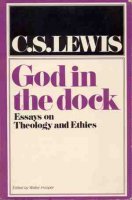 God in the Dock: Essays on Theology and Ethics by C. S. Lewis, edited by Walter Hooper (Eerdmans, 1970)
God in the Dock: Essays on Theology and Ethics by C. S. Lewis, edited by Walter Hooper (Eerdmans, 1970)
I found this to be one of the best collections of short Lewis essays I've read. It's a relatively long book (346 pages) but the individual essays are short and easily readable. It helps a lot that the editor has thoughtfully translated the many times Lewis—who seems to prefer to quote his sources in their original language—lapses into tongues.
(It occurs to me that I would have a lot more time to read if I didn't insist on writing about the books. On the bright side, however, writing up the quotations not only gives readers the flavor of a book—or at least the book as seen through my eyes—but also serves as a useful reference and memory aid for me.)
From "Dogma and the Universe"
Change is not progress unless the core remains unchanged. A small oak grows into a big oak: if it becomes a beech, that would not be growth, but mere change. (p. 45)
In the twinkling of an eye, in a time too small to be measured, and in any place, all that seems to divide us from God can flee away, vanish leaving us naked before Him ... as if nothing but He and I existed. And since that contact cannot be avoided for long, and since it means either bliss or horror, the business of life is to learn to like it. That is the first and great commandment. (p. 47)
From "Answers to Questions on Christianity"
If there is anything in the teaching of the New Testament which is in the nature of a command, it is that you are obliged to take the Sacrament, and you can't do it without going to Church. (p. 61)
From "Myth Became Fact"
God is more than a god, not less; Christ is more than Balder, not less. We must not be ashamed of the mythical radiance resting on our theology. We must not be nervous about "parallels" and "Pagan Christs": they ought to be there—it would be a stumbling block if they weren't. (p. 67)
From "Horrid Red Things"
All language, except about objects of sense, is metaphorical through and through. To call God a "Force" (that is, something like a wind or a dynamo) is as metaphorical as to call Him a Father or a King. On such matters we can make our language more polysyllabic and duller: we cannot make it more literal. (p. 71)
From "Christian Apologetics"
[Speaking to a group of Anglican priests and youth leaders} It seems to the layman that in the Church of England we often hear from our priests doctrine which is not Anglican Christianity. ... It is not, of course, for me to define to you what Anglican Christianity is. ... But I insist that wherever you draw the lines, bounding lines must exist, beyond which your doctrine will cease either to be Anglican or to be Christian: and I suggest also that the lines come a great deal sooner than many modern priests think. I think it is your duty to fix the lines clearly in your own minds: and if you wish to go beyond them you must change your profession. This is your duty not specially as Christians or as priests but as honest men. ... We never doubted that the unorthodox opinions were honestly held: what we complain of is your continuing your ministry after you have come to hold them. (pp. 89-90)
If one has to choose between reading the new books and reading the old, one must choose the old: not because they are necessarily better but because they contain precisely those truths of which our own age is neglectful. (p. 92)
What we want is not more little books about Christianity, but more little books by Christians on other subjects—with their Christianity latent. ... It is not the books written in direct defense of Materialism that make the modern man a materialist; it is the materialistic assumptions in all the other books. In the same way, it is not books on Christianity that will really trouble him. But he would be troubled if, whenever he wanted a cheap popular introduction to some science, the best work on the market was always by a Christian. (p. 93)
I find that the uneducated Englishman is an almost total sceptic about History. I had expected he would disbelieve the Gospels because they contain miracles: but he really disbelieves them because they deal with things that happened 2000 years ago. He would disbelieve equally in the battle of Actium if he heard of it. To those who have had our kind of education, his state of mind is very difficult to realize. To us the Present has always appeared as one section in a huge continuous process. In his mind the Present occupies almost the whole field of vision. Beyond it, isolated from it, and quite unimportant, is something called "The Old Days"—a small, comic jungle in which highwaymen, Queen Elizabeth, knights-in-armour etc. wander about. Then (strangest of all) beyond The Old Days comes a picture of "Primitive Man." He is "Science," not "History," and is therefore felt to be much more real than The Old Days. In other words, the Pre-historic is much more believed in than the Historic. (pp. 94-95)
It is useless to direct attention (1) To sins your audience do not commit, or (b) To things they do, but do not regard as sins. They are usually not drunkards. They are mostly fornicators, but then they do not feel fornication to be wrong. It is, therefore, useless to dwell on either of these subjects. (Now that contraceptives have removed the obviously uncharitable element in fornication I do not myself think we can expect people to recognize it as sin until they have accepted Christianity as a whole.) (p. 96)
We must learn the language of our audience. And let me say at the outset that it is no use at all laying down a priori what the "plain man" does or does not understand. You have to find out by experience. (p. 96)
Lewis does include a few examples of words, common to the society of his own peers, which have meanings quite different for the "average Joe." I think class language differences were much greater in England, and in Lewis's time, than they are in America now that television has largely homogenized our speech, but I have observed the problem even here and now. It is of no use—even worse than useless—for example, to use the word "capitalism" without a careful effort to make sure we and the people we are communicating with are working from even remotely similar definitions of the word. Very often we are not.
From "Work and Prayer"
Prayers are not always—in the crude, factual sense of the word—"granted." This is not because prayer is a weaker kind of causality, but because it is a stronger kind. When it "works" at all it works unlimited by space and time. That is why God has retained a discretionary power of granting or refusing it: except on that condition prayer would destroy us. (p. 107)
From "On the Transmission of Christianity"
I took so many quotations from this chapter that it has its own post.
From "The Founding of the Oxford Socratic Club"
In any fairly large and talkative community such as a university there is always the danger that those who think alike should gravitate together into coteries where they will henceforth encounter opposition only in the emasculated form of rumour that the outsiders say thus and thus. The absent are easily refuted, complacent dogmatism thrives, and differences of opinion are embittered by group hostility. Each group hears not the best, but the worst, that the other group can say. (p. 127)
From "The Trouble with "X"
It's not a question of God "sending" us to Hell. In each of us there is something growing up which will of itself be Hell unless it is nipped in the bud. (p. 155)
From "Dangers of National Repentance"
The first and fatal charm of national repentance is ... the encouragement it gives us to turn from the bitter task of repenting for our own sins to the congenial one of bewailing—but, first, of denouncing—the conduct of others. (p. 190)
The hard sayings of our Lord are wholesome to those only who find them hard. (p. 191)
From "On the Reading of Old Books"
There is a strange idea abroad that in every subject the ancient books should be read only by the professionals, and that the amateur should content himself with the modern books. Thus I have found as a tutor in English Literature that if the average student wants to find out something about Platonism, the very last thing he thinks of doing is to take a translation of Plato off the library shelf and read the Symposium. He would rather read some dreary modern book ten times as long, all about "isms"and influences and only once in twelve pages telling him what Plato actually said. ... It has always therefore been one of my main endeavours as a teacher to persuade the young that first-hand knowledge is not only more worth acquiring than second-hand knowledge, but is usually much easier and more delightful to acquire. (p. 200)
Naturally, since I myself am a writer, I do not wish the ordinary reader to read no modern books. But if he must read only the new or only the old, I would advise him to read the old. And I would give him this advice precisely because he is an amateur and therefore much less protected than the expert against the dangers of an exclusive contemporary diet. A new book is still on its trial and the amateur is not in a position to judge it. (p. 201)
Every age has its own outlook. It is specially good at seeing certain truths and specially liable to make certain mistakes. We all, therefore, need the books that will correct the characteristic mistakes of our own period. And that means the old books. ... We may be sure that the characteristic blindness of the twentieth century—the blindness about which posterity will ask, "But how could they have thought that?"—lies where we have never suspected it. ... None of us can fully escape this blindness, but we shall certainly increase it, and weaken our guard against it, if we read only modern books. Where they are true they will give us truths which we half knew already. Where they are false they will aggravate the error with which we are already dangerously ill. The only palliative is to keep the clean sea breeze of the centuries blowing through our minds, and this can be done only by reading old books. ... Two heads are better than one, not because either is infallible, but because they are unlikely to go wrong in the same direction. To be sure, the books of the future would be just as good a corrective as the books of the past, but unfortunately we cannot get at them. (p. 202)
We are all rightly distressed, and ashamed also, at the divisions of Christendom. But those who have always lived within the Christian fold may be too easily dispirited by them. They are bad, but such people do not know what it looks like from without. Seen from there, what is left intact, despite all the divisions, still appears (as it truly is) an immensely formidable unity. ... That unity any of us can find by going out of his own age. It is not enough, but it is more than you had thought till then. Once you are well soaked in it, if you then venture to speak, you will have an amusing experience. You will be thought Papist when you are actually reproducing Bunyan, a Pantheist when you are quoting Aquinas, and so forth. (p. 204)
From "The Decline of Religion"
The "decline of religion" [is] a very ambiguous phenomenon. One way of putting the truth would be that the religion which has declined was not Christianity. It was a vague Theism with a strong and virile ethical code, which, far from standing over against the "World," was absorbed into the whole fabric of English institutions and sentiment and therefore demanded church-going as (at best) a part of loyalty and good manners [or] (at worst) a proof of respectability. Hence a social pressure, like the withdrawal of the compulsion, does not create a new situation. The new freedom first allows accurate observations to be made. When no man goes to church except because he seeks Christ the number of actual believers can at last be discovered. It should be added that the new freedom was partly caused by the very conditions which it revealed. If the various anti-clerical and anti-theistic forces at work in the nineteenth century had had to attack a solid phalanx of radical Christians the story might have been different. But mere "religion"—"morality tinged with emotion," "what a man does with his solitude," "the religion of all good men"—has little power of resistance. It is not good at saying No. (pp 219-220)
We have not yet had (at least in junior Oxford) any really bitter opposition. But if we have many more successes, this will certainly appear. The enemy has not yet thought it worthwhile to fling his whole weight against us. But he soon will. This happens in the history of every Christian movement, beginning with the Ministry of Christ Himself. At first it is welcome to all who have no special reason for opposing it: at this stage he who is not against it is for it. What men notice is its difference from those aspects of the World which they already dislike. But later on, as the real meaning of the Christian claim becomes apparent, its demand for total surrender, the sheer chasm between Nature and Supernature, men are increasingly "offended." Dislike, terror, and finally hatred succeed; none who will not give it what it asks (and it asks all) can endure it; all who are not with it are against it. That is why we must cherish no picture of the present intellectual movement simply growing and spreading and finally reclaiming millions by sweet reasonableness. Long before it became as important as that the real opposition would have begun, and to be on the Christian side would be costing a man (at the least) his career. But remember, in England the opposition will quite likely be called Christianity (or Christo-democracy, or British Christianity, or something of that kind). I think—but how would I know?—that all is going reasonably well. But it is early days. Neither our armour nor our enemies' is yet engaged. Combatants always tend to imagine that the war is further on than it really is. (pp. 222-223)
From "God in the Dock"
The first thing I learned from addressing the R.A.F [Royal Air Force] was that I had been mistaken in thinking materialism to be our only considerable adversary. Among the English "Intelligentsia of the Proletariat," materialism is only one among many non-Christian creeds. ... Even where Christianity was professed, it was often much tainted with Pantheistic elements. Strict and well-informed Christian statements, when they occurred at all, usually came from Roman Catholics or from members of extreme Protestant sects (e.g. Baptists). My student audiences shared, in a less degree, the theological vagueness I found in the R.A.F., but among them the strict and well-informed statements came from Anglo-Catholics and Roman Catholics; seldom, if ever, from Dissenters. (pp. 240-241)
I wonder what my Baptist friends—such normal and reasonable people—think about being considered an "extreme Protestant sect"?
From "Cross-Examination"
Writing is like a "lust," or like "scratching when you itch." Writing comes as a result of a very strong impulse, and when it does come, I for one must get it out. (p. 258)
Yep.
The way for a person to develop a style is (a) to know exactly what he wants to say, and (b) to be sure he is saying exactly that. The reader, we must remember, does not start by knowing what we mean. If our words are ambiguous, our meaning will escape him. I sometimes think that writing is like driving sheep down a road. If there is any gate open to the left or the right the readers will most certainly go into it. (p. 263)
The world might stop in ten minutes; meanwhile, we are to go on doing our duty. The great thing is to be found at one's post as a child of God, living each day as though it were our last, but planning as though our world might last a hundred years. (p. 266)
From "First and Second Things"
A foreign policy dominated by desire for peace is one of the many roads that lead to war. (p. 281)
From "The Sermon and the Lunch"
Must we not teach that if the home is to be a means of grace it must be a place of rules? There cannot be a common life without a regula. The alternative to rule is not freedom but the unconstitutional (and often unconscious) tyranny of the most selfish member. (p. 286)
From "The Humanitarian Theory of Punishment"
Of all tyrannies a tyranny sincerely exercised for the good of its victims may be the most oppressive. It may be better to live under robber barons than under omnipotent moral busybodies. The robber baron's cruelty may sometimes sleep, his cupidity may at some point be satiated, but those who torment us for our own good will torment us without end for they do so with the approval of their own conscience. (p. 292)
The practical problem of Christian politics is not that of drawing up schemes for a Christian society, but that of living as innocently as we can with unbelieving fellow-subjects under unbelieving rulers who will never be perfectly wise and good and who will sometimes be very wicked and very foolish. (p. 292)
From "Delinquents in the Snow"
According to the classical political theory of this country we surrendered our right of self-protection to the State on condition that the State would protect us. Roughly, you promised not to stab your daughter's murderer on the understanding that the State would catch him and hang him. Of course this was never true as a historical account of the genesis of the State. The power of the group over the individual is by nature unlimited and the individual submits because he has to. The State, under favourable conditions (they have ceased), by defining that power, limits it and gives the individual a little freedom.
But the classical theory morally grounds our obligation to civil obedience; explains why it is right (as well as unavoidable) to pay taxes, why it is wrong (as well as dangerous) to stab your daughter's murderer. At present the very uncomfortable position is this: the State protects us less because it is unwilling to protect us against criminals at home and manifestly grows less able to protect us against foreign enemies. At the same time it demands from us more and more. We seldom had fewer rights and liberties nor more burdens; and we get less security in return. While our obligations increase their moral ground is taken away.
And the question that torments me is how long flesh and blood will continue to endure it. There was even, not so long ago, a question whether they ought to. (p. 308)
What I fear ... is not, or not chiefly, sporadic outbreaks of individual vengeance. I am more afraid, our conditions being so like that of the South after the American Civil War, that some sort of Ku Klux Klan may appear and that this might eventually develop into something like a Right or Central revolution. For those who suffer are chiefly the provident, the resolute, the men who want to work, who have built up, in the face of implacable discouragement, some sort of life worth preserving and wish to preserve it. That most (by no means all) of them are "middle class" is not very relevant. They do not get their qualities from a class: they belong to that class because they have those qualities. For in a society like ours no stock which has diligence, forethought or talent, and is prepared to practise self-denial, is likely to remain proletarian for more than a generation. They are, in fact, the bearers of what little moral, intellectual, or economic vitality remains. They are not nonentities. There is a point at which their patience will snap. ...
Revolutions seldom cure the evil against which they are directed; they always beget a hundred others. Often they perpetuate the old evil under a new name. ... A Right or Central revolution would be as hypocritical, filthy and ferocious as any other. My fear is lest we should be making it more probable. (p. 309)
From "Is Progress Possible?"
As a Christian I take it for granted that human history will some day end; and I am offering Omniscience no advice as to the best date for that consummation. I am more concerned by what the [Atomic] Bomb is doing already.
One meets young people who make the threat of it a reason for poisoning every pleasure and evading every duty in the present. Didn't they know that, Bomb or no Bomb, all men die (many in horrible ways)? There's no good moping and sulking about it. (p. 312)
As a means to the ends I care for, [science] is neutral. We shall grow able to cure, and to produce, more diseases—bacterial war, not bombs, might ring down the curtain—to alleviate, and to inflict, more pains, to husband, or to waste, the resources of the planet more extensively. We can become either more beneficent or more mischievous. My guess is we shall do both: mending one thing and marring another, removing old miseries and producing new ones, safeguarding ourselves here and endangering ourselves there. (p. 312)
Two wars necessitated vast curtailments of liberty, and we have grown, though grumblingly, accustomed to our chains. The increasing complexity and precariousness of our economic life have forced Government to take over many spheres of activity once left to choice or chance. ... Classical political theory, with its Stoical, Christian, and juristic key-conceptions (natural law, the value of the individual, the rights of man), has died. The modern State exists not to protect our rights but to do us good or make us good—anyway, to do something to us or to make us something. Hence the new name "leaders" for those who were once "rulers. We are less their subjects than their wards, pupils, or domestic animals. There is nothing left of which we can say to them, "Mind your own business." Our whole lives are their business. (pp. 313-314)
I dread government in the name of science. That is how tyrannies come in. In every age the men who want us under their thumb, if they have any sense, will put forward the particular pretension which the hopes and fears of that age render most potent. They "cash in." It has been magic, it has been Christianity. Now it will certainly be science. Perhaps the real scientists may not think much of the tyrants' "science"—they didn't think much of Hitler's racial theories or Stalin's biology. But they can be muzzled. (p. 315)
The question about progress has become the question whether we can discover any way of submitting to the world-wide paternalism of a technocracy without losing all personal privacy and independence. Is there any possibility of getting the super Welfare State's honey and avoiding the sting?
Let us make no mistake about the sting. The Swedish sadness is only a foretaste. To live his life in his own way, to call his house his castle, to enjoy the fruits of his own labour, to educate his children as his conscience directs, to save for their prosperity after his death—these are wishes deeply ingrained in ... civilized man. Their realization is almost as necessary to our virtues as to our happiness. From their total frustration disastrous results both moral and psychological might follow. (p. 316, emphasis mine)
From "We Have No 'Right to Happiness'"
I believe—whatever one school of moralists may say—that we depend for a very great deal of our happiness or misery on circumstances outside all human control. A right to happiness doesn't, for me, make much more sense than a right to be six feet tall, or to have a millionaire for your father, or to get good weather whenever you want to have a picnic. (p. 318)
When I was a youngster, all the progressive people were saying, "Why all this prudery? Let us treat sex just as we treat all our other impulses." I was simple-minded enough to believe they meant what they said. I have since discovered that they meant exactly the opposite. They meant that sex was to be treated as no other impulse in our nature has ever been treated by civilized people. All the others, we admit, have to be bridled. Absolute obedience to your instinct for self-preservation is what we call cowardice; to your acquisitive impulse, avarice. Even sleep must be resisted if you're a sentry. But every unkindness and breach of faith seems to be condoned provided that the object aimed at is "four bare legs in a bed." (p. 320)
C. S. Lewis wrote the Preface to a book by B. G. Sandhurst entitled How Heathen is Britain? This essay has been republished as the thirteenth chapter of Lewis's book, God in the Dock, which I recently finished re-reading. I deemed the excerpts below too extensive for my review of that book, so here they are in their own post.
The essay, written in the mid-1940's, deals largely with the effect of state education on students' beliefs and attitudes about the Christian faith. A few quotes can't do justice to the logic of the argument, but should suffice to give the flavor. All bold emphasis is my own.
The content of, and the case for, Christianity, are not put before most schoolboys under the present system; ... when they are so put a majority find them acceptable. ... [These two facts] blow away a whole fog of "reasons for the decline of religion" which are often advanced and often believed. If we had noticed that the young men of the present day found it harder and harder to get the right answers to sums, we should consider that this had been adequately explained the moment we discovered that schools had for some years ceased to teach arithmetic. (p. 115)
The sources of unbelief among young people today do not lie in those young people. The outlook which they have—until they are taught better—is a backwash from an earlier period. It is nothing intrinsic to themselves which holds them back from the Faith. This very obvious fact—that each generation is taught by an earlier generation—must be kept very firmly in mind. (p. 116)
No generation can bequeath to its successor what it has not got. You may frame the syllabus as you please. But when you have planned and reported ad nauseam, if we are skeptical we shall teach only skepticism to our pupils, if fools only folly, if vulgar only vulgarity, if saints sanctity, if heroes heroism. ... Nothing which was not in the teachers can flow from them into the pupils. (p. 116)
A society which is predominantly Christian will propagate Christianity through its schools: one which is not, will not. All the ministries of education in the world cannot alter this law. We have, in the long run, little either to hope or fear from government.
The State may take education more and more firmly under its wing. I do not doubt that by so doing it can foster conformity, perhaps even servility, up to a point; the power of the State to deliberalize a profession is undoubtedly very great. But all the teaching must still be done by concrete human individuals. The State has to use the men who exist. Nay, as long as we remain a democracy, it is men who give the State its powers. And over these men, until all freedom is extinguished, the free winds of opinion blow. Their minds are formed by influences which government cannot control. And as they come to be, so will they teach. ... Let the abstract scheme of education be what it will: its actual operation will be what the men make it. ... Your "reform" may incommode and overwork them, but it will not radically alter the total effect of their teaching. (pp. 116-117)
Where the tide flows towards increasing State control, Christianity, with its claims in one way personal and in the other way ecumenical and both ways antithetical to omnicompetent government, must always in fact (though not for a long time yet in words) be treated as an enemy. Like learning, like the family, like any ancient and liberal profession, like the common law, it gives the individual a standing ground against the State. Hence Rousseau, the father of the totalitarians, said wisely enough, from his own point of view, of Christianity, Je ne connais rien de plus contraire à l'esprit social ("I know nothing more opposed to the social spirit"). ... Even if we were permitted to force a Christian curriculum on the existing schools with the existing teachers we should only be making masters hypocrites and hardening thereby the pupils' hearts. (p. 118)
I am speaking, of course, of large schools on which a secular character is already stamped. If any man, in some little corner out of the reach of the omnicompetent, can make, or preserve a really Christian school, that is another matter. His duty is plain. (p. 119)
What a society has, that, be sure, and nothing else, it will hand on to its young. The work is urgent, for men perish around us. But there is no need to be uneasy about the ultimate event. As long as Christians have children and non-Christians do not, one need have no anxiety for the next century. (p. 119)
Clearly Lewis did not anticipate that Christians would embrace the radical move to very small families nearly as much as secular society did. I'm thankful for those who are now reversing that trend. The idea is mocked today ("evangelism by procreation"), but Lewis—though he had a difficult home life and no biological children of his own—clearly recognized the life- and faith-affirming value of begetting and bearing children in Christian families.
As for the rest of the quotations: it is still true that democratic governments have much less control over what children think and learn than they would like. But the same is now also true of teachers. Lewis was thinking of the influence of teachers when he wrote,
Planning has no magic whereby it can elicit figs from thistles or choke-pears from vines. The rich, sappy, fruit-laden tree will bear sweetness and strength and spiritual health; the dry, prickly, withered tree will teach hate, jealousy, suspicion, and inferiority ... [no matter what] you tell it to teach. (pp. 117-118)
This is even more true, now, of the movies, music, and other media that are the very air our young people breathe (and rarely think about), and of the peer-oriented society we have bequeathed them. As I wrote in my review of Gordon Neufeld and Gabor Maté's book Hold On to Your Kids (a book I strongly recommend to all parents, grandparents, teachers, pastors, and anyone else who cares about children),
It is essential to the survival of a civilization that its culture be passed on from one generation to another. Today's children are not receiving culture, they are inventing it as they go along. We are into the third generation of this problem, and appear to be reaching a tipping point. If the idea of peer culture being more important to children than their family culture doesn't seem strange and wrong to us, it's because that's how we grew up, too.
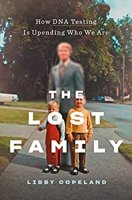 The Lost Family: How DNA Testing is Upending Who We Are by Libby Copeland (Abrams Press, 2020)
The Lost Family: How DNA Testing is Upending Who We Are by Libby Copeland (Abrams Press, 2020)
I been working seriously on genealogical research for almost two decades—the library-and-paper kind, supplemented by the steadily-increasing availability of records online. Then at the end of 2017 we dipped our toes into genetic genealogy, submitting saliva samples first to AncestryDNA, then to 23andMe. There have been a few small surprises, but nothing monumental.
However, my genealogical connections—primarily Ancestry.com and the New England Historic Genealogical Society—frequently send me other people's "DNA reveal" stories: the kind where Holocaust survivors from the same family find each other 60 years later, or adoptees find their birth parents, or people discover that the man they've always called "Dad" has no genetic relationship with them. Mystery, tragedy, triumph—it's all there.
Thus my eagerness to read this book as soon as I heard about it. Our library had already seen the wisdom of having The Lost Family on its shelves; when I looked for it, it was already on order. As soon as it came in, I grabbed it. What with other things to do, it took me three days to devour it.
The Lost Family is actually three books:
- The stories. This is why I wanted to read the book in the first place. Unfortunately, there aren't that many, for all it's nearly a 300-page book. And I guess I shouldn't have been surprised that the biggest story of all, the framework for the whole book, was one I already knew. That was okay; I learned many details that I hadn't known. But I wish more of the book had been dedicated to the real-life stories.
- A good deal of teaching on the science behind genetic testing and DNA analysis. Most of this was old news to me, but it's complicated and a review is not a bad thing. If you're new to the field, it's definitely a good thing.
- A lot of most-unwelcome preaching, filled with identity politics; and how interest in genealogy is racist if you're white though apparently not if you are black; and a confusing section in which the author uses "they" to refer to both a single, transgender person who requested that personal pronoun and to multiple-person groups; and how "race" is a racist concept and "ethnicity" doesn't really exist (and is probably a racist idea, anyway); and how history is fluid and there's no such thing as truth but only your truth and my truth and their truth.
Reading the book was much like eating a meal in which I was repeatedlly given a bite of chocolate cake, then a bite of chicken, then a bite of okra. I know, some people actually like okra. They may even like the political sections of the book. I did not.
In addition, there's a lot of angst and questioning: "Who am I, really?" "What is a family?" "Can I love Irish music if I discover that my heritage is not Irish, as I thought, but Russian?" "What makes me the person I am, my genes or my experiences?"
I'm certain I'd feel more empathetic if I were the adoptee seeking birth parents, or the daughter who discovered her father wasn't the man she thought he was. The personal angle does make all things new. But the nature vs. nurture question has been around as long as we have realized they were separate influences. To me, the obvious answer is "both." End of story. I never imagined anyone would take seriously the AncestryDNA commercial in which a man gets the results of his DNA test and "turns in his lederhosen for a kilt." I never did have patience for the idea that you can only enjoy a culture if you were born into it.
Nor did I imagine that anyone would expect a DNA test to reveal exact genetic origins. Although it's getting better all the time, and is considerably more accurate now than in the early days, it's still part science, part art, and part guesswork. That's made pretty clear if you look into it at all, though I admit the commercials—like most commercials—give a simplified and thus somewhat false impression.
Besides, I hate stories about angst. Romances, coming-of-age-stories—not my thing at all.
Am I glad I read the book? Yes. Am I glad I didn't buy it? Definitely yes. Would I recommend reading it? Well, if you're thinking about taking a DNA test, it's a decent introduction to the art-and-science, and a fair warning that your world could be turned upside down. And the stories are interesting. Overall, yes, I would recommend it.
Some people, after all, even like okra.
There were only six sticky notes marking quotations this time. (At least the book was easier to review!) Bolded emphasis is mine.
At times, the sense of mission among members [of the Church of Jesus Christ of Latter-Day Saints] has gotten out of hand, as when members have submitted the names of Jews, including Holocaust victims, for posthumous baptism. (p. 30)
This is typical of an attitude I find puzzling throughout the book. A Catholic who discovers that her biological father was Jewish wonders if she should become Jewish herself, as if one's faith is something inherited rather than a statement of beliefs. I guess this goes along with the "your truth and my truth but nothing is really true" idea. I suppose it's also a sign of someone who hasn't delved too deeply into his ancestry, which would hardly reveal a unanimity of faith.
If you believe, as the Mormons do, that they can save the souls of their dead ancestors through a present-day ceremony, and some of their ancestors happen to have been Jewish, why exclude them from the eternal family? If the Mormons are right, they will be doing those Jewish ancestors the greatest possible favor. If they are wrong, then they are certainly not doing them any harm.
[Describing researchers at a genealogical library] They may be hobbyists or pros; they may travel as groups of genealogical societies, the better to swap stories and resources. They may come from far away—Canada, France, England, New Zealand, all over the United States—and park at the library every day for a full week. Sometimes, people planning to do just a little research stay far longer than they meant to, as if they fall into some kind of wormhole that alters time. This place can do that to you. (p. 31)
So true. She wasn't describing the NEHGS library in Boston, but she might have been.
We're such believers in genes that a recent Stanford University study found that informing people of their genetic predispositions for certain traits—rather, misinforming them, by telling them whether they had certain gene variants associated with exercise capacity and obesity, regardless of their actual results—influenced their actual physiology. Those told they had low-endurance versions of a gene variant did worse on a treadmill test, with poorer endurance and worse lung function (even if they didn't actually have that gene variant). Those told they had a variant that made them feel easily sated felt fuller on average after being given a meal, and tests revealed their bodies had produced more of a hormone that indicates feelings of fullness. By believing they were genetically destined for something, these subjects appear to have made it true. (p. 57)
I love stories of that kind, too.
Europe's market [for DNA testing] is seen as several years behind the US market because of a complex tapestry of policy, pragmatism, and culture. In general, says David Nicholson of UK-based Living DNA, Europeans are more concerned than Americans with matters of privacy and security. (p. 135)
This is a common belief, but I find it to be not so simple. In my limited experience, Europeans are indeed more concerned than Americans about giving their data to businesses, but I think most Americans would be shocked at how much information European governments have on their people, and especially how widespread and well-coordinated that information is. The post office, the train station, the police, the schools, the motor vehicle departments—what one knows, the others know. In the early days of homeschooling, many families were able to "fly under the radar" by never registering their children for school. In Switzerland, the schools know about your children from the day they are born. All that shared knowledge turns out to be convenient at times, but, being an American, I trust knowledge in private hands more than in the hands of the government, because governments have more power. I may hate that Google is so powerful and knows so much about me, but it wasn't Google that with one fell swoop shut down the American economy and separated us from our children and grandchildren.
Roth found that testers who identified as black or African American were far less inclined to incorporate new ancestral knowledge into their identities. In part, that's because they tended to identify strongly and positively with their existing identities; unlike white respondents, they did not describe their race as boring and plain. (p. 167)
Finally, acknowledgement in print of what I experienced in my childhood—at least from fourth grade onward. The worst thing you could be was a WASP: I distinctly remember announcing that since I couldn't help being white and of Anglo-Saxon heritage, I'd have to become Catholic. Even in my tiny, nearly-all-white village in Upstate New York, being white, at least in the dominant school narrative, was associated with being dull, stupid, ignorant, rude, and klutzy. I often wonder why this isn't more universally acknowledged; surely I can't have been the only one to have noticed it.
Alice verified which of the Collins siblings' genetic segments came from their father by matching them against known paternal cousins, and, by putting it all together, she could approximate a good portion of what Jim's chromosomes looked like, effectively raising him from the dead. (p. 272)
Hmmm. Whatever the author's religion is, count me out. I think Christianity offers a far more appealing view of what it means to be raised from the dead. :)
This year my children and my husband got together for an entirely different kind of Mother's Day treat: a selection of Jeni's Ice Cream delivered in dry ice to our door.
My favorite Connecticut ice cream store, Grass Roots, had an ad on Facebook that said, Your momma called: she wants Grassroots ice cream. I laughed in appreciation when I saw it, knowing that my sister-in-law might get something from Grass Roots for Mother's Day, but it was out of the question for me.
And then this happened. It wasn't Grass Roots, but it was delicious and had the Grass Roots approach to unusual flavors.
First, of course, we played with the dry ice. It's much more fun if you have grandchildren to share it with. And to no one's surprise, there's a lot less dry ice left when it's delivered to Florida than when it's delivered to New Hampshire. Still, we enjoyed the moment. Here's the short version.
Now for the ice cream itself, in order of our trials. Boy, was that the wrong word. It was hardly a trial to enjoy these treats!
Blackout Chocolate Cake A chocolate ice cream quadruple threat with cake, extra-bitter fudge and chocolate pieces. Fantastic. Rich, darkly chocolate. Better than Publix's Chocolate Trinity? I don't know. Give me a large bowl of each side by side and I'll see what I can figure out. It might take several experiments....
Brown Butter Almond Brittle Brown butter almond candy crushed into buttercream ice cream. Is is possible that there could be something better than chocolate? I found this only moderately promising from the description, but oh, my what a flavor! A little almond, a little caramel, a little reminiscent of the wonderful milk ice cream we ate in Japan. It's subtle, but may even be my favorite of the Jeni's flavors, since Publix does so well in the chocolate department.
Skillet Cinnamon Roll Dark caramel, cream cheese, pastry, and cinnamon (lots of it). Not in the same league as the first two, but definitely good. If I liked cream cheese frosting more than I do, it might be great. I'd happily eat it again.
Caramel Pecan Sticky Buns (Dairy-Free) Rich coconut cream loaded with sticky bun dough, dark caramel, and roasted pecans. Fortunately, Porter liked this. It was far from his favorite, but he certainly made sure it wasn't wasted. I'm glad I tried it, but in a word, no. First, the "dairy-free" label is a big warning sign, and makes me think fake from the beginning, with overtones of margarine, artificial sweeteners, and decaffeinated tea. Then there's the c-word: coconut. I enjoy coconut in savory Indonesian dishes, and that's about it. Not at all in anything sweet. Pecans are another thing I like only in certain contexts (like salads) but desserts is not one of them. Sticky bun dough and caramel? Now those are winners, but frankly the overwhelming flavor was coconut—which is why Porter liked it and I didn't.
Pineapple Upside Down Cake Sweet-tart pineapple with golden cake, red cherries, and a caramel swirl. This is what I opened when I turned the coconut-flavored ice cream over to Porter. It seemed fair: he doesn't care much for pineapple; I do. This one was smooth and delicious, but the other tastes were overwhelmed by the pineapple.
Lemon & Blueberry Parfait Tart and uber creamy lemon with from-scratch blueberry jam in fresh cultured buttermilk and cream. Delicious, and the lemon makes it very refreshing. I love lemon, and this has an excellent flavor, but it does overwhelm the blueberry.
Sweet Cream Biscuits & Peach Jam Buttermilk ice cream, crumbled biscuits, and swirls of jam made with Georgia peaches from "The Peach Truck." Very yummy. The biscuits are noticeable by both taste and texture, just about the right amount in each case. The peach flavor is excellent.
Salty Caramel Fire-toasted sugar with sea salt, vanilla, and gress-grazed milk. A perfect balance of salty and sweet. This also was delicious, though I'll admit it was even better when paired with some Chocolate Trinity. I love the combination of chocolate and caramel.
Brambleberry Crisp Oven-toasted oat streusel with sweet-tart bramble berry jam of blackberries and blackcurrants layered throughout vanilla ice cream. I'm running out of things to say other than "delicious." But that it was. The vanilla is a better foil for the berries than lemon was for the blueberries. The oat streusel is reminiscent of a good-quality granola or an oatmeal cookie.
If I were to be blessed with such a gift on another occasion, what would I want to repeat? Any of them except the dairy-free variety would be welcomed, but Number 1 on my list would clearly be the Brown Butter Almond Brittle. It was the biggest surprise of all the flavors, and the most memorable. If there's an equivalent elsewhere I haven't found it.
I went over to the Jeni's website to check out some of the other flavors they offer. I'd definitely want to try their Gooey Butter Cake, in honor of our most pleasant visit to my nephew when he lived in St. Louis. Maybe Churro, or Cream Puff, or Boston Cream Pie, or Pistachio & Honey. Texas Sheet Cake and Dark Chocolate Truffle sound good, but both are dairy-free so I would steer clear of them. Porter would love Goat Cheese with Red Cherries, but I don't think I'd offer to help him finish that pint.
Brown Butter Almond Brittle aside, the best part of Jeni's is the variety and the opportunity to taste unusual flavors. I'm really thinking Grass Roots should get into the delivery business. :) Or maybe not; to do that they might have to grow too much and lose their small, local-business cachet. But it's a thought.
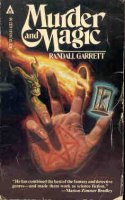

 Murder and Magic, by Randall Garrett (Ace, 1979; written 1964-1973)
Murder and Magic, by Randall Garrett (Ace, 1979; written 1964-1973)
Too Many Magicians, by Randall Garrett (Ace, 1966)
Lord Darcy Investigates, by Randall Garrett (Ace, 1981; written 1974-1979)
A recent sermon brought to mind this line from Murder and Magic: "Black magic is a matter of symbolism and intent." I hasten to explain that Fr. Trey was not preaching about black magic; he only used the phrase, "form, intent, and matter," which set off my easily-distracted brain. He is not responsible for the fact that my mind is a junkyard of random snippets of stories and poems.
Be that as it may, it caused me to realize that it had been some time since I last read Randall Garrett's clever and enjoyable stories about Lord Darcy, a detective living in an alternate universe, in which King Richard I of England did not die from an arrow wound in 1199, but lived to found the mighty Anglo-French Empire, under a centuries-long Plantagenet dynasty still reigning in the 1970's.
In this world, the art of magic developed into a science, and what we call science was relegated to the hedgerows and backwaters. This topsy-turvy scenario serves Garrett very well as he weaves his murder mysteries and detective puzzles.
Too Many Magicians is a novel; the other two books are collections of shorter stories.
With a hat tip to my friend Dr. Gaunce Lewis, who introduced me to these delightful stories, I picked up Murder and Magic again, noting with shock that it had been more than a decade since I had read it. As with any good book revisited, I found something new in this reading. Garrett is known for his wordplay and allusions, some of which are detailed in the Lord Darcy Wikipedia article. However, the article misses what to me is a very obvious homage to Dorothy Sayers' novel The Nine Tailors, in Garrett's story, "The Muddle of the Woad." I love making connections like that! I say it is obvious, but somehow I missed it the countless previous times I read Murder and Magic. I guess it is like most puzzles—the solution is obvious once you see it.
Too Many Magicians successfully spins the protagonists' adventures to novel-length, with special delights for fans of Rex Stout's Nero Wolfe books. It repeats the "Black magic is a matter of symbolism and intent" line, which may help explain why that has stuck in my memory. My re-reading pleasure this time was enhanced by the following paragraph:
Physician, heal thyself, Master Sean throught wryly. The phrase was archaic only in that Healers no longer relied on "physick" to heal their patients. When the brilliant genius, St. Hilary Robert, worked out the laws of magic in the Fourteenth Century, the "leech" and the "physician" might have heard their death knell ringing from the bell tower of the little English monastery at Walsingham, where St. Hilary lived. Not everyone could use the laws; only those who had the Talent. But the ceremony of healing by the Laying On of Hands had, from that time on, become as reliable as it had been erratic before. (p. 22)
What makes this paragraph interesting is that it illustrates the Baader-Meinhof phenomenon. I'd never heard of the English village of Walsingham until our church's new rector came, less than two years ago—but ever since I've been encountering the town in unexpected places, including two separate detective fiction series. To be sure, both of those series are set in Britain; I will be shocked if I encounter Walsingham in the Leaphorn & Chee books.
Lord Darcy Investigates takes us back to the short story format, and is just as much fun as the others. Here's my favorite quote from that book:
"Like all great detectives, my lord, you have the ability to leap from an unjustified assumption to a foregone conclusion without passing through the distance between. Then you back up and fill in."
I see no reason not to recommend these books as SFGC (safe for grandchildren), but skip reading about the author himself if you want to continue to give him the respect these books deserve. Learning more about the real lives of one's heroes is often a strong cure for the sin of idolatry.
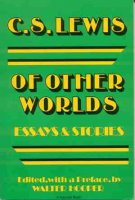 Of Other Worlds: Essays and Stories by C. S. Lewis, edited by Walter Hooper (Harcourt, Brace & Company, 1966)
Of Other Worlds: Essays and Stories by C. S. Lewis, edited by Walter Hooper (Harcourt, Brace & Company, 1966)
The essays in this collection (On Stories, On Three Ways of Writing for Children, Sometimes Fairy Stories May Say Best What's to Be Said, On Juvenile Tastes, It All Began with a Picture, On Criticism, On Science Fiction, A Reply to Professor Haldane, and Unreal Estates) are all included in C. S. Lewis: On Stories, which contains several additional essays as well, making the latter by far the more interesting book..
The remainder of this book consists of two little-known stories that were published in The Magazine of Fantasy and Science Fiction in the 1950's (The Shoddy Lands, Ministering Angels), one previously unpublished story (Forms of Things Unknown) and the beginnings of a novel inspired by the Trojan War (After Ten Years).
Forms of Things Unknown I enjoyed the most, for its clever, classical twist at the end, and because it alone has no female characters of any importance. The other three portray male attitudes toward women that lead me to despair of the human race. After Ten Years is nonetheless interesting, though only a fragment. Ministering Angels I wish I could forget. The Shoddy Lands has an appalling view of women, all the more so that I can tell from some of his non-fiction writings that it is somewhat reflective of Lewis's own experiences. Nonetheless, I find it the best of the four works, being an unforgettable portrayal of the self-centered blindness common to us all.
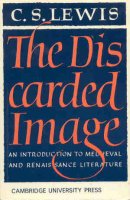 The Discarded Image: An Introduction to Medieval and Renaissance Literature by C. S. Lewis (Cambridge University Press, 1964)
The Discarded Image: An Introduction to Medieval and Renaissance Literature by C. S. Lewis (Cambridge University Press, 1964)
I knew I was out of my league here by page 23, when I read, "Plato's Republic, as everyone knows, ends with an account of the after-life...." No, I didn't know that. Neither 13 years of public education at well-respected schools, nor a college degree (University of Rochester, mathematics), nor growing up in a well-educated family (albeit with an emphasis on engineering and science), nor my own voluminous reading, led me to read anything, anything at all, by Plato. That I had even heard of him is thanks to Lewis's own Narnia books, wherein Professor Kirke exclaims, often enough to be memorable, "It's all in Plato, all in Plato: bless me, what do they teach them at those schools!"
Not much, apparently.
And generally not anything that Lewis would recognize as absolutely essential for one to be considered an educated man. What did they teach me at those schools? (I console myself, slightly, with the knowledge that Lewis couldn't handle mathematics. At all.)
But here's the funny thing: I still enjoyed reading the book, and have had my eyes opened to a little of the beauty, intelligence, and nobility of the Middle Ages, which modern culture thinks of simply as "dark." (And yet, and yet ... even George Lucas chose knights and swords and chivalry to tell his great futuristic story.)
It's a short book (not much over 200 small pages, and surprisingly easy to read despite Lewis's frequent use of terms in Latin, Greek, French, and Middle English, and his assumption that the reader is familiar with books that few of us have ever heard of, much less read. Don't let that throw you off; it's well worth reading.
One cannot hope to understand medieval literature, Lewis insists, without an appreciation for "the medieval synthesis itself, the whole organization of their theology, science, and history into a single, complex, harmonious mental Model of the Universe." (p. 11) Viewing Medieval works with a Modern mindset guarantees misunderstandings and wrong interpretations. The Discarded Image gives even woefully under-educated readers like me a few clues as to what we have been missing.
Not that you'll get those clues from my quotations, but here are some things that particularly struck me.
Despite what we enlightened moderns think of our backward ancestors,
The insignificance (by cosmic standards) of the Earth [was] as much a commonplace to the medieval, as to the modern, thinker." (p. 26)
In a prolonged war the troops on both sides may imitate one another's methods and catch one another's epidemics; they may even occasionally fraternise. So in this period [when Christianity was replacing Paganism]. The conflict between the old and the new religion was often bitter, and both sides were ready to use coercion when they dared. But at the same time the influence of the one upon the other was very great. During these centuries much that was of Pagan origin was built irremovably into the Model. It is characteristic of the age that more than one of the works I shall mention has sometimes raised a doubt whether its author was Pagan or Christian. (pp. 45-46)
No one who had read of Fortuna as [Boethius] treats her could forget her for long. His work, here Stoical and Christian alike, in full harmony with the Book of Job and with certain Dominical sayings, is one of the most vigorous defences ever written against the view, common to vulgar Pagans and vulgar Christians alike, which "comforts cruel men" by interpreting variations of human prosperity as divine rewards and punishments, or at least wishing that they were. It is an enemy hard to kill. (p. 82)
Note that Lewis died the year Joel Osteen was born....
Beyond the Stellatum there is a sphere called the First Movable or Primum Mobile. This, since it carries no luminous body, gives no evidence of itself to our senses; its existence was inferred to account for the motions of all the others. (p. 96, emphasis mine)
A technique scientists have been employing ever since!
The dimensions of the medieval universe are not, even now ... generally realized.... The reader of this book will already know that Earth was, by cosmic standards, a point—it had no appreciable magnitude. The stars, as the Somnium Scipionis had taught, were larger than it. Isidore in the sixth century knows that the Sun is larger, and the Moon smaller than the Earth, ... Maimonides in the twelfth maintains that every star is ninety times as big, Roger Bacon in the thirteenth simply that the least star is "bigger" than she. As to estimates of distance, we are fortunate in having the testimony of a thoroughly popular work, the South English Legendary: better evidence than any learned production could be for the Model as it existed in the imagination of ordinary people. We are there told that if a man could travel upwards at the rate of "forty mile and yet som del mo" a day, he would not have reached the Stellatum ... in 8000 years.
[These facts] become valuable only in so far as they enable us to enter more fully into the consciousness of our ancestors by realising how such a universe must have affected those who believed in it. The recipe for such realisation is not the study of books. You must go out on a starry night and walk about for half an hour trying to see the sky in terms of the old cosmology. Remember that you now have an absolute Up and Down. The Earth is really the centre, really the lowest place; movement to it from whatever direction is downward movement. As a modern, you located the stars at a great distance. For distance you must now substitute that very special, and far less abstract, sort of distance which we call height; height, which speaks immediately to our muscles and nerves. The Medieval Model is vertiginous. And the fact that the height of the stars in the medieval astronomy is very small compared with their distance in the modern, will turn out not to have the kind of importance you anticipated. For thought and imagination, ten million miles and a thousand million are much the same. ... The really important difference is that the medieval universe, while unimaginably large, was also unambiguously finite. And one unexpected result of this is to make the smallness of Earth more vividly felt. In our universe she is small, no doubt; but so are the galaxies, so is everything—and so what? ... To look out on the night sky with modern eyes is like looking out over a sea that fades away into mist, or looking about one in a trackless forest—trees forever and no horizon. To look up at the towering medieval universe is much more like looking at a great building. (pp. 97-99)
While the moral and emotional consequences of the cosmic dimensions were emphasised, the visual consequences were sometimes ignored. ... [Modern men] have grown up from childhood under the influence of pictures that aimed at the maximum of illusion and strictly observed the laws of perspective. We are mistaken if we suppose that mere commonsense, without any such training, will enable men to see an imaginary scene, or even to see the world they are living in, as we all see it today. Medieval art was deficient in perspective, and poetry followed suit. ... Nature, for Chaucer, is all foreground; we never get a landscape. And neither poets nor artists were much interested in the strict illusionism of later periods. The relative size of objects in the visible arts is determined more by the emphasis the artist wishes to lay upon them than by their sizes in the real world or by their distance. Whatever details we are meant to see will be shown whether they would really be visible or not. ... Of the medieval and even the Elizabethan imagination in general ... we may say that in dealing with even foreground objects, it is vivid as regards colour and action, but seldom works consistently to scale. We meet giants and dwarfs, but we never really discover their exact size. Gulliver was a great novelty. (pp. 100-102)
Aquinas treats the question [of astrological determinism] very clearly. On the physical side the influence of the spheres is unquestioned. Celestial bodies affect terrestrial bodies, including those of men. And by affecting our bodies they can, but need not, affect our reason and our will. They can, because our higher faculties certainly receive something ... from our lower. They need not, because any alteration of our imaginative power produced in this way generates, not a necessity, but only a propensity, to act thus or thus. The propensity can be resisted; hence the wise man will over-rule the stars. But more often it will not be resisted, for most men are not wise; hence, like actuarial predictions, astrological predictions about the behaviour of large masses of men will often be verified. (pp. 103-104)
The erroneous notion that the medievals were Flatearthers was common enough till recently. ... One [possible source] is that medieval maps, such as the great thirteenth-century mappemounde in Hereford cathedral, represent the Earth as a circle, which is what men would do if they believed it to be a disc. But what would men do if, knowing it was a globe and wishing to represent it in two dimensions, they had not yet mastered the late and difficult art of projection? ... A glance at the Hereford mappemounde suggests that thirteenth-century Englishmen were almost totally ignorant of geography. But they cannot have been anything like so ignorant as the cartographer appears to be. For one thing the British Isles themselves are one of the most ludicrously erroneous parts of his map. Dozens, perhaps hundreds, of those who looked at it when it was new, must at least have known that Scotland and England were not separate islands. ... And secondly, medieval man was by no means a static animal. Kings, armies, prelates, diplomats, merchants, and wandering scholars were continually on the move. Thanks to the popularity of pilgrimages even women, and women of the middle class, went far afield.... I doubt whether the maker of the mappemounde would have been at all disquieted to learn that many an illiterate sea-captain knew enough to refute his map in a dozen places. ... The cartographer wished to make a rich jewel embodying the noble art of cosmography, with the Earthly Paradise marked as an island at the extreme Eastern edge (the East is at the top in this as in other medieval maps) and Jerusalem appropriately in the center. Sailors themselves may have looked at it with admiration and delight. They were not going to steer by it. (pp. 142-144)
Marco Polo's great Travels (1295) is easily accessible and should be on everyone's shelves. (p. 145)
Sigh. A couple of thousand books on our shelves and not one of them is Marco Polo's.
I am inclined to think that most of those who read "historical" works about Troy, Alexander, Arthur, or Charlemagne, believed their matter to be in the main true. But I feel much more certain that they did not believe it to be false. I feel surest of all that the question of belief or disbelief was seldom uppermost in their minds. ... Everyone "knew"—as we all "know" how the ostrich hides her head in the sand—that the past contained Nine Worthies: three Pagans (Hector, Alexander, and Julius Caesar); three Jews (Joshua, David, and Judas Maccabaeus); and three Christians (Arthur, Charlemagne, and Godfrey of Bouillon). Everyone "knew" we were descended from the Trojans—as we all "know" how Alfred burned the cakes and Nelson put the telescope to his blind eye. As the spaces above us were filled with daemons, angels, influences, and intelligences, so the centuries behind us were filled with shining and ordered figures, with the deeds of Hector and Roland, with the spendours of Charlemagne, Arthur, Priam, and Solomon. It must be remembered throughout that the texts we should now call historical differed in outlook and narrative texture from those we should call fictions far less than a modern "history" differs from a modern novel. Medieval historians dealt hardly at all with the impersonal. Social or economic conditions and national characteristics come in only by accident or when they are required to explain something in the narrative. The chronicles, like the legends, are about individuals; their valour or villainy, their memorable sayings, their good or bad luck. (pp. 181-182)
I thought that in an age when books were few and the intellectual appetite sharp-set, any knowledge might be welcome in any context. But this does not explain why the authors so gladly present knowledge which most of their audience must have possessed. One gets the impression that medieval people, like Professor Tolkien's Hobbits, enjoyed books which told them what they already knew. (p. 200)
It has lately been shown that many Renaissance pictures which were once thought purely fanciful are loaded, and almost overloaded, with philosophy.
The book-author unit, basic for modern criticism, must often be abandoned when we are dealing with medieval literature. Some books ... must be regarded more as we regard those cathedrals where work of many different periods is mixed and produces a total effect, admirable indeed but never foreseen nor intended by any one of the successive builders. ... It would have been impossible for men to work in this way if they had had anything like our conception of literary property. But it would also have been impossible unless their idea of literature had differed from ours on a deeper level. Far from feigning originality, as a modern plagiarist would, they are apt to conceal it. ... They are anxious to convince others, perhaps to half-convince themselves, that they are not merely "making things up." For the aim is not self-expression or "creation"; it is to hand on the "historical" matter worthily; not worthily of your own genius or of the poetic art but of the matter itself. (pp. 210-211)
 C. S. Lewis: A Companion and Guide by Walter Hooper (Harper San Francisco, 1996)
C. S. Lewis: A Companion and Guide by Walter Hooper (Harper San Francisco, 1996)
At over 940 pages in length, this is not a book for casual reading, although it is in large measure quite readable, and over time I read it all. It is more of a reference book, and as it covers nearly everything Lewis wrote, I've found it an invaluable "companion" on my "C. S. Lewis retrospective" journey. Hooper provides the background for each book, which I found by far the most interesting part, along with summaries of both the text and its reviews.
Despite its reference-book nature, I still found a few quotes to pass on.
When [Lewis] was seventeen, he learned that Arthur Greeves was ill, and wrote to him ... "Cheer up, whenever you are fed up with life, start writing: ink is the great cure of all human ills, as I have found out long ago." (p. 49)
That is the truth.
From Canto I of Lewis's poem, Dymer:
At Dymer’s birth no comets scared the nation,
The public crèche engulfed him with the rest,
And twenty separate Boards of Education
Closed round him. He passed through every test,
Was vaccinated, numbered, washed and dressed,
Proctored, inspected, whipt, examined weekly,
And for some nineteen years he bore it meekly. (p. 149)
Although written a hundred years ago, as a prophecy of modern American childhood it is chillingly accurate.
In the letter to Arthur Greeves of 18 August 1930 he said: "The side of me which longs, not to write, for no one can stop us doing that, but to be approved as a writer, is not the side of us that is really worth much. And depend upon it, unless God has abandoned us, he will find means to cauterize that side somehow or other." (p. 155)
From a letter to the publisher of Letters to Malcolm:
Would it be good to say "Some passages are controversial but this is almost an accident. The wayfaring Christian cannot quite ignore recent Anglican theology when it has been built as a barricade across the high road." (p. 380, emphasis mine)
Pauline Baynes, the illustrator of his Narnia books, speaking of a meeting with Lewis:
He answered, "Things one finds easy are invariably the best." This took a lot of thinking about, for though it is of course logical, up till then I had thought that nothing could be worthwhile that had not been a battle, a difficulty overcome, and that good things could only come after a lot of hard work and rubbing out. Of course he was right: if one knows about something so that you can draw it effortlessly it will be fluent and direct. (p. 407)
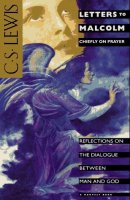 Letters to Malcolm: Chiefly on Prayer by C. S. Lewis (Harcourt Brace Jovanovich, 1963)
Letters to Malcolm: Chiefly on Prayer by C. S. Lewis (Harcourt Brace Jovanovich, 1963)
Unlike Lewis's Letters to Children, this "correspondence" between Lewis and the fictional Malcolm is a literary device, a platform he used for writing speculatively, rather than authoritatively, on prayer. He had tried years earlier to write an ordinary book on prayer, but found it coming out too much like "teaching" for him to feel comfortable writing, as a layman. In a sense this is more like The Screwtape Letters, but without the humor and the skewed perspective.
Authoritative or not, there's a lot of wisdom in this, the last book Lewis wrote.
The crisis of the present moment, like the nearest telegraph-post, will always loom largest. Isn't there a danger that our great, permanent, objective necessities—often more important—may get crowded out? By the way, that's another thing to be avoided in a revised Prayer Book. "Contemporary problems" may claim an undue share. And the more "up to date" the book is, the sooner it will be dated. (p. 12, emphasis mine)
I find that problem with Holy Eucharist Rite II of the Episcopal Church. Rite I is older, but to me feels more relevant and less dated than some of the passages in the newer version, introduced in the late 1970's. There are a few things I like better about Rite II, but really, some of the prayers there actually make me wince. Not in a good, convicted-of-sin way; more like when I see a 1970's hairstyle in an old photograph. Bringing out still another version of the Prayer Book would not solve the problem, but only make it worse—it would become dated even sooner.
The increasing list of people to be prayed for is ... one of the burdens of old age. I have a scruple about crossing anyone off the list. When I say a scruple, I mean precisely a scruple. I don't really think that if one prays for a man at all it is a duty to pray for him all my life. But when it comes to dropping him now, this particular day, it somehow goes against the grain. And as the list lengthens, it is hard to make it more than a mere string of names. (p. 66)
That one hit home. Not only with my own prayers, but especially with our church's prayer ministry. Once upon a time, the prayer list was small enough that we could receive details and regular updates and felt connected with those we were praying for, even those we didn't know. Now it has grown so large that it is indeed little more than a string of names of strangers. God knows who and what we are praying for—but something has been lost.
As Lewis said, it's very hard to take someone off a prayer list, especially those with long-term needs. But when my own list approaches a certain critical size, I find my reluctance to pray (instead of just thinking about it) increases exponentially. As with so many things in life, the trick is finding the right balance, I guess.
In Pantheism God is all. But the whole point of creation surely is that He was not content to be all. He intends to be "all in all." (p. 70)
I talked to a continental pastor who had seen Hitler, and had, by all human standards, good cause to hate him. "What did he look like?" I asked. "Like all men," he replied. "That is, like Christ." (p. 74)
God is present in each thing but not necessarily in the same mode: not in a man as in the consecrated bread and wine, nor in a bad man as in a good one, nor in a beast as in a man, nor in a tree as in a beast, nor in inanimate matter as in a tree. I take it there is a paradox here. The higher the creature, the more, and also the less, God is in it; the more present by grace, and the less present (by a sort of abdication) as mere power. By grace he gives the higher creatures power to will His will ("and wield their little tridents"): the lower ones simply execute it automatically. (pp. 74-75)
It is well to have specifically holy places, and things, and days, for, without these focal points or reminders, the belief that all is holy ... will soon dwindle into a mere sentiment. But if these holy places, things, and days cease to remind us, if they obliterate our awareness that all ground is holy and every bush (could we but perceive it) a Burning Bush, then the hallows begin to do harm. (p. 75)
Joy is the serious business of Heaven. (p. 93)
Of course I pray for the dead. The action is so spontaneous, so all but inevitable, that only the most compulsive theological case against it would deter me. And I hardly know how the rest of my prayers would survive if those for the dead were forbidden. At our age the majority of those we love best are dead. What sort of intercourse with God could I have if what I love best were unmentionable to Him?
On the traditional Protestant view, all the dead are damned or saved. If they are damned, prayer for them is useless. If they are saved, it is equally useless. God has already done all for them. What more should we ask?
But don't we believe that God has already done and is already doing all that He can for the living? What more should we ask? Yet we are told to ask.
"Yes," it will be answered, "but the living are still on the road. Further trials, developments, possibilities of error, await them. But the saved have been made perfect. They have finished the course. To pray for them presupposes that progress and difficulty are still possible. In fact, you are bringing in something like Purgatory."
Well, I suppose I am. ... I believe in Purgatory. Mind you, the Reformers had good reasons for throwing doubt on "the Romish doctrine concerning Purgatory" as that Romish doctrine had then become. I don't mean merely the commercial scandal. If you turn from Dante's Purgatorio to the sixteenth century you will be appalled by the degradation. In Thomas More's Supplication of Souls Purgatory is simply temporary Hell. ... Its pains do not bring us nearer to God, but make us forget Him. It is a place not of purification but purely of retributive punishment.
The right view returns magnificently in Newman's Dream. There, if I remember it rightly, the saved soul, at the very foot of the throne, begs to be taken away and cleansed. ... My favorite image on this matter comes from the dentist's chair. I hope that when the tooth of life is drawn and I am "coming round," a voice will say, "Rinse your mouth out with this." This will be Purgatory. The rinsing may take longer than I can now imagine. The taste of this may be more fiery and astringent than my present sensibility could endure. But [they] shall not persuade me that it will be disgusting and unhallowed. (pp. 107-109)
Let's now at any rate come clean. Prayer is irksome. An excuse to omit it is never unwelcome. When it is over, this casts a feeling of relief and holiday over the rest of the day. We are reluctant to begin. We are delighted to finish. While we are at prayer, but not while we are reading a novel or solving a cross-word puzzle, any trifle is enough to distract us. ... And we know that we are not alone in this. The fact that prayers are constantly set as penances tells its own tale. (p. 113)
The disquieting thing is not simply that we skimp and begrudge the duty of prayer. The really disquieting thing is it should have to be numbered among duties at all. For we believe that we were created "to glorify God and enjoy Him forever." And if the few, the very few, minutes we now spend on intercourse with God are a burden to us rather than a delight, what then? If I were a Calvinist this symptom would fill me with despair. ... If we were perfected, prayer would not be a duty, it would be delight. Some day, please God, it will be. (pp. 113-114)
 Letters to Children by C. S. Lewis, edited by Lyle W. Dorsett and Marjorie Lamp Mead (Touchstone, 1985)
Letters to Children by C. S. Lewis, edited by Lyle W. Dorsett and Marjorie Lamp Mead (Touchstone, 1985)
For a man whose primary experience with children was that he had once been one himself, C. S. Lewis does a remarkable job of writing to them with the respect due to their intelligence and wisdom. He talks down to them only a very little—and frankly, from the heights of his intellect, there's no other way to talk with almost anyone, of any age, but down. This collection of letters, written mostly to admirers of his Narnia books, on both sides of the Atlantic, contains both information and wisdom I've not seen elsewhere in his writings.
My first quotation is from the rather long introductory material, and sheds light on some of the restrictions imposed on children in olden times. We shake our heads, but we who live in the age of vaccines and antibiotics have no right to laugh.
[The lives of Jack Lewis and his brother Warren] were remarkably like the lives of children today—with one major exception: when it rained, which it did often in Belfast, the Lewis brothers were not allowed outside. This rain-time restriction was the result of the danger of tuberculosis, a disease dreadfully more serious in the early 1900s than it is now. Keeping children warm and dry was a parent's best defense against the threat. (pp. 10-11)
Where I grew up the great thing was Halloween.... There was always a slightly eerie, spooky feeling mixed with games, events, and various kinds of fortune telling—not a good night on which to walk through a churchyard. (Tho' in fact Irish people, believing in both, are much more afraid of fairies than of ghosts.) (p. 37)
This astonished me, and makes me feel better about what I had thought was an inconsistency in the Harry Potter books. I had never been able to figure out why Hallowe'en figures so prominently in them, while Guy Fawkes's Day is neglected. I was relying on a friend from Heather's first grade days, who had recently moved here from England, and couldn't understand "this strange American holiday, Hallowe'en." I know now that, at least in some parts of the United Kingdom, the holiday was well established long before J. K. Rowling was born.
I've never seen Aida, but I've known the music since I was a small boy: and how good it is. It's rather the fashion over here now amongst the musical snobs to look down their noses when Verdi is mentioned and talk about the "cheapness of his thematic material." What they really mean is that Verdi could write tunes and they can't! (p. 48)
The [Narnia] books don't tell us what happened to Susan. She is left alive in this world at the end, having by then turned into a rather silly, conceited young woman. But there is plenty of time for her to mend, and perhaps she will get to Aslan's country in the end—in her own way. (p. 67)
I think I agree with your order for reading the [Narnia] books [chronologically] more than with your mother's [in publication order]. (p. 68)
I've said it before: Lewis may be the author, but I think he's wrong. It's much more powerful to read The Magician's Nephew after The Lion, the Witch, and the Wardrobe, looking backwards and discovering, for example, the origin of the Wardrobe and the Lamp Post.
Provided the thing is in itself right, the more one likes it and the less one has to "try to be good," the better. A perfect man would never act from sense of duty; he'd always want the right thing more than the wrong one. Duty is only a substitute for love (of God and of other people), like a crutch, which is a substitute for a leg. Most of us need the crutch at times; but of course it's idiotic to use the crutch when our own legs (our own loves, tastes, habits etc.) can do the journey on their own! (p. 72)
The following is for all my teacher friends, especially the university math professor who knows how true this is!
Beware of the [mathematics] master who over-marks the work. Generous marking is nice for the moment, but it can lead to disappointments when, later, one comes up against the real thing. American university teachers have told me that most of their freshmen come from schools where the standard was far too low and therefore think themselves far better than they really are. This means that they lose heart (and their tempers too) when told, as they have to be told, their real level. (pp. 83-84, emphasis mine)
What a drole idea in Florida, to give credits not for what you know but for hours spent in a classroom! Rather like judging the condition of an animal not by its weight or shape but by the amount of food that had been offered it! (p. 88, emphasis mine)
I was at three schools (all boarding schools) of which two were very horrid. I never hated anything so much, not even the front line trenches in World war I. Indeed the story is far too horrid to tell anyone of your age. (p. 102)
And on that depressing note I'll close. Letters to Children is not one of Lewis's most freqeuntly read books, but it is well worth the effort if you can find a copy.
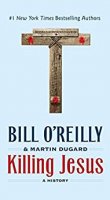 Killing Jesus: A History by Bill O'Reilly and Martin Dugard (Henry Holt, 2013)
Killing Jesus: A History by Bill O'Reilly and Martin Dugard (Henry Holt, 2013)
I wasn't planning to read another of O'Reilly's Killing series so soon after Kennedy and Reagan. But while writing that review it hit me that there would be no more appropriate time to read Killing Jesus than during Holy Week. I began on Good Friday and finished on Easter Sunday.
I'd been hesitating over this one, the subject being far dearer to my heart than any of our presidents. Plus, I knew the work was bound to be somewhat speculative, and therefore somewhat inaccurate, the source documents not being as plentiful as those O'Reilly and Dugard have had to work with for their other books. But as with the others in this series, I was pleasantly surprised.
It is clearly a secular book, as I expected. The authors' efforts are historical, not theological. I don't believe there's anything to cause an atheist, Muslim, or other non-Christian to cringe.
No, I take that back. There are some very cringe-worthy moments (for anyone) such as in the descriptions of just what the common and well-honed practices of torture and punishment did to the human body, mind, and spirit, and the stories of debaucheries and perversions—especially of the Roman emperor Tiberius—that are not all that graphic but certainly make me wish my imagination were a little less vivid. But none theological.
If the sources for this book were not as easily accessible as YouTube videos of presidential speeches, that doesn't mean it isn't well-documented. Research—historical, archaeological, textual—and books abound about that time period, and the original records are plentiful and well-attested.
The historical record may not have been as immediately accessible as that of more recent times, but the men who wrote the history of that period were very much concerned with getting their facts straight and telling the story as completely as possible. The Romans were very keen to chronicle their times. (p. 276)
The authors appear to have done an admirable job of crafting the historical records into a smooth and coherent narrative, beginning as far back as 44 B.C. with the assassination of Julius Caesar. Because it is a craft, there is of necessity some speculation, and surely some error, in filling the gaps and reconciling differing accounts. For example, they posit not one but two separate cleansings of the temple in Jerusalem, which may be true but is not a theory I'd heard before. They also perpetrate the idea that Mary Magdalene was a prostitute, which stems from an error about 1400 years old and only recently corrected. Nonetheless, Killing Jesus does a much better job of making the life and death and times of Jesus come alive, while remaining true to the facts, than any other book or movie I've experienced. Christian versions tend to be cloying and feel unreal—it is abominably difficult to portray holiness!—and secular versions tend to give the impression that the authors believe the only way to get at the historical truth is to debunk anything specifically Christian about it. O'Reilly and Dugard walk that line very well.
You won't find any theology in Killing Jesus, nor for that matter any clear statement of how Christianity makes sense of the narrative. They suggest C. S. Lewis' Mere Christianity for that; the recommendation is hidden away in the "Sources" appendix. Without the theology, their analysis of Jesus' purpose, his message, and his thoughts as he approaches his death comes across as rather lame, but I commend them for recognizing—contrary to a sermon I once heard—that he was not caught off guard by the events but knew what was going to happen and why.
Side note 1: Can I just say that reading the about events in Rome, and looking at the maps, have ten- or maybe a hundred-fold more meaning for me since our visit to that city last September? Travel, or at least many travel videos, ought to be a part of everyone's education from early on.
Side note 2: In the Afterward, a "where are they now?" look at the principal players, the authors mention our favorite Swiss mountain, Pilatus, because it was named after Pontius Pilate.
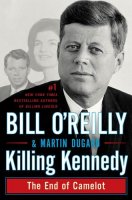
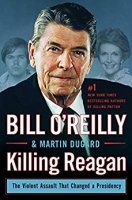 Killing Kennedy: The End of Camelot by Bill O'Reilly and Martin Dugard (Henry Holt, 2012)
Killing Kennedy: The End of Camelot by Bill O'Reilly and Martin Dugard (Henry Holt, 2012)
Killing Reagan: The Violent Assault that Changed a Presidency by Bill O'Reilly and Martin Dugard (Henry Holt, 2015)
As I said about the book, Killing Lincoln, to open any of Bill O'Reilly's books one must to put aside one's prejudices, as he is quite a controversial figure. It's well worth the effort: these are fascinating books. I'd say it's my ignorance of history that makes them so interesting to me, but my history-buff husband enjoyed them as well.
O'Reilly's book on Lincoln treated the man as a saint; Kennedy and Reagan don't get the same courtesy, nor do any of the other presidents touched upon (Johnson, Nixon, Ford, and Carter); even Dr. Martin Luther King, Jr., is treated with blunt honesty. The books are neither exposés nor hagiographies, but appear to be well-researched efforts to paint accurate pictures of the men and their times.
The more I learn about our past presidents, the more normal Donald Trump appears. It was a great advantage to serve in the days before Twitter and incessant media coverage.
Both Killing Kennedy and Killing Reagan are easy to read and hard to put down, and I'd highly recommend them for our oldest grandchildren and one of their friends who is a great history buff—with the warning that O'Reilly pulls no punches when revealing that most of these folks (Carter being the exception) would make a tomcat blush. And because Reagan began as an actor, the cesspool nature of Hollywood high society is also revealed. You know those TV and movie actors whose characters you so admire? The Ten Commandments' prohibition of idolatry was never more pertinent.
It's not so much about sex as it is about power—sex is just one part of how the powerful get what they want. Still, as I've said before, many of the same character traits that enable people to become rich and powerful also enable them to be the high achievers we depend on. I'm learning more and more that wheat and tares grow in the same heart, and that one can be grateful for the good that people do without countenancing the harm.
Idolizing any human being is worse than futile.
I became acquainted with some of the dark underside of the Kennedy family while living in Massachusetts, but I was still shocked at what I learned through Killing Kennedy. Of Reagan I had expected less, and therefore was the more pleasantly surprised that many of his offenses diminished once he attained the White House. He seemed to rise to the occasion. Apparently one of his strengths was knowing how to surround himself with good advisors—and listening to them. Kennedy also grew noticeably during his presidency, though he was harmed by nepotism and being surrounded by too many "yes men."
I was more sparse than usual with my quotations for these books, which are better read as a whole than in snippets. Or maybe I was just lazy.
From Killing Kennedy I marked only one, which stood out because you would think it came from the book about Reagan. I cannot imagine any Democratic president or presidential candidate advocating this position now.
The president, without consulting notes, then rattles off a long list of statistics. He presses for a tax cut, to ward off a recession, he says, and backs it up with detailed financial specifics about the way in which cutting taxes would stimulate the economy. (p. 208)
The rest of the quotes are from Killing Reagan.
[Reagan's children Michael and Maureen] will long remember their father as loving but also absent from their lives for long periods of time—as was their mother. Both children are sent away to boarding school by the time they enter the second grade. "There's a distinct difference between the care provided by a parent and the care provided by a paid caretaker," Maureen will say years later. "It was simply one of the prices all of us had to pay for their success." (p. 30, emphasis mine)
Yes.
"Communism has become an intensely dogmatic and almost mystical religion, and whatever you say, they have ways of twisting it into shapes which put you in some lower category of mankind," wrote novelist and screenwriter F. Scott Fitzgerald, describing the ideological tension in Hollywood. (p. 37)
Plus ça change....
Reagan's hatred of communism has not abated one bit since his days as president of the Screen Actors Guild. If anything, his convictions have become more intense: "I think it would be very admirable if the Berlin Wall, which was built in direct contravention to a treaty, should disappear. I think this would be a step toward peace and toward self-determination for all people, if it were." (p. 80)
Reagan said that in 1967, as governor of California, just six years after the Wall's construction. Twenty-two years later the Wall will fall—due to many converging factors, but in no small part to his efforts as president of the United States.
[Reagan's] first real battle [as governor of California] came when the members of a radical group of African-Americans known as the Black Panther Party occupied the California State Capitol Building in Sacramento. In accordance with the Second Amendment to the U.S. Constitution, which allows citizens the right to bear arms, these twenty-four men and six women openly displayed the .357 Magnum pistols and 12-gauge shotguns they carried. California law states that carrying weapons openly in public is legal, and the Panthers were in Sacramento to argue against impending legislation that would revoke this right. The protest ended peacefully, but not before Republicans in the state legislature pushed through a bill that made gun control in California a reality. And it is the gun-loving Reagan himself who gladly signed the bill into law. (p. 82)
See the above quote about John F. Kennedy pushing for tax cuts!
Four years ago, Jimmy Carter did not feel it appropriate to celebrate his inauguration with even one formal ball, let alone ten. No partying for the man from Plains. Instead, Carter's 1977 inaugural address was somber, pointing out America's limitations as a nation. The tone of pessimism and defeat that marked Carter's first day in office came to define his entire presidency. If Ronald Reagan's first day in office is any indication of what is to come, the United States of America is in for a far more upbeat presidency. (p. 145)
And indeed it was true. Unlike with the other presidents, O'Reilly has a hard time finding anything negative to say about Carter as a person—though I get the impression that he did not find Carter's sexual fidelity, church attendance, and teetotal White House something to be particularly admired. But he's right about the pessimism of Carter's years in office. Carter seems to have missed what Reagan used to his advantage: both pessimism and optimism are contagious, and a good leader sets the tone for his followers. As C. S. Lewis said in The Horse and His Boy,
"For this is what it means to be a king: to be first in every desperate attack and last in every desperate retreat, and when there’s hunger in the land (as must be now and then in bad years) to wear finer clothes and laugh louder over a scantier meal than any man in your land."
[Jack Hinkley sits down with his son John, who will add this to his long list of sins and failures: he will attempt to assassinate President Reagan.] Jack is direct, telling his son that he is no longer welcome in their home. "You've broken every promise you've made to your mother and me. Our part of the agreement was to provide you with a home and an allowance while you've worked at becoming independent. I don't know what you've been doing these past months, but it hasn't been that. And we've reached the end of our rope."
John Hinckley is shocked. Even at age twenty-five, he is so accustomed to having his parents solve his problems that his father's words stun him. (p. 156, emphasis mine)
Even at age twenty-five. Clearly that was a different century, when it was considered shocking for someone to reach the age of 25 without acquiring adult skills and taking on adult responsibilities.
In defiance of Reagan, more than eleven thousand air traffic controllers ignore his warning and continue to walk the picket lines. Forty-four hours later, Reagan makes good on his promise.
They are fired.
All of them.
"I'm sorry," Reagan tells the press. "I'm sorry for them. I certainly take no joy out of this."
Later, Reagan will reflect on this day with a sense of justification. "I think it convinced people who thought otherwise that I meant what I said."
Especially the Soviets.
George Schultz, who will one day serve as Reagan's secretary of state, will call this "the most important foreign policy decision Reagan has ever made." (p. 198)
Next up? Killing Jesus. I've been hesitating over this one, the subject being far dearer to my heart than any of our presidents. Plus, the work is bound to be somewhat speculative, and therefore somewhat inaccurate, the source documents not being as plentiful as those O'Reilly has had to work with for his other books.
But it is, after all, the right time of year.
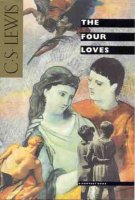 The Four Loves by C. S. Lewis (Harcourt Brace Jovanovich, 1960)
The Four Loves by C. S. Lewis (Harcourt Brace Jovanovich, 1960)
Of all the Lewis books I've read so far, this is the one I've had the hardest time relating to—even more so than to An Experiment in Criticism. It's still an excellent book, but the world in which Lewis lived is very different from my own, and that shows up strongly in his analysis of what he designates as the Four Loves: Affection, Friendship, Eros, and Charity.
I should have known we were on different wavelengths when I encountered, very early in the book, this statement:
[A drink of water] is a pleasure if you are thirsty and a great one if you are very thirsty. But probably no one in the world, except in obedience to thirst or to a doctor’s orders, ever poured himself out a glass of water and drank it just for the fun of the thing. (p. 11)
I most certainly have done just that, and do so frequently. While other drinks (e.g. milk, unpasteurized orange juice or apple cider, and of course tea) also bring me delight, water is by far my favorite drink. I wonder what the water in Lewis's life tasted like—I know for certain it couldn't have been like the incomparable Adirondack Mountain water from my childhood. But even most tap water is better to me than most other drinks. By the second page of the first chapter, I was already feeling alienated.
But of course that is trivial. More difficult was realizing that my experience of his categories of love has been so different from his. Especially when he speaks of differences between men and women. ("Lewis and Women" is a blog topic in its own right.) I don't deny his experiences—but they're not mine.
Nonetheless, there was enough to relate to in this book, and I had no trouble finding quotes to pull.
Nature does not teach. A true philosophy may sometimes validate an experience of nature; an experience of nature cannot validate a philosophy. Nature will not verify any theological or metaphysical proposition; ... she will help to show what it means. (p. 20)
As love of family is the first step beyond self-love, love of home comes next. Lewis sees proper patriotism in this light, and I think he is spot-on.
First, there is love of home, of the place we grew up in or the places, perhaps many, which have been our homes; and of all places fairly near these and fairly like them; love of old acquaintances, of familiar sights, sounds, and smells. ... With this love for the place there goes a love for the way of life; for beer and tea and open fires, trains with compartments in them and an unarmed police force and all the rest of it; for the local dialect and (a shade less) for our native language. As Chesterton says, a man’s reasons for not wanting his country to be ruled by foreigners are very like his reasons for not wanting his house to be burned down; because he "could not even begin" to enumerate all the things he would miss. It would be hard to find any legitimate point of view from which this feeling could be condemned. ... Those who do not love the fellow-villagers or fellow-townsmen whom they have seen are not likely to have got very far towards loving "Man" whom they have not.
Of course patriotism of this kind is not in the least aggressive. It asks only to be let alone. It becomes militant only to protect what it loves. In any mind which has a pennyworth of imagination it produces a good attitude towards foreigners. How can I love my home without coming to realise that other men, no less rightly, love theirs? Once you have realised that the Frenchmen like café complet just as we like bacon and eggs—why, good luck to them and let them have it. The last thing we want is to make everywhere else just like our own home. It would not be home unless it were different. (pp. 23-24, emphasis mine)
Another aspect of patriotism is not quite so harmless, but still beneficial.
The second ingredient is a particular attitude to our country’s past. I mean to that past as it lives in popular imagination.... This past is felt both to impose an obligation and to hold out an assurance; we must not fall below the standard our fathers set us, and because we are their sons there is good hope we shall not.
This feeling has not quite such good credentials as the sheer love of home. The actual history of every country is full of shabby and even shameful doings. The heroic stories, if taken to be typical, give a false impression of it and are often themselves open to serious historical criticism. .... But who can condemn what clearly makes many people, at many important moments, behave so much better than they could have done without its help?
I think it is possible to be strengthened by the image of the past without being either deceived or puffed up. The image becomes dangerous in the precise degree to which it is mistaken, or substituted, for serious and systematic historical study. The stories are best when they are handed on and accepted as stories. I do not mean by this that they should be handed on as mere fictions (some of them are after all true). But the emphasis should be on the tale as such, on the picture which fires the imagination, the example that strengthens the will. ... What does seem to me poisonous, what breeds a type of patriotism that is pernicious if it lasts ... is the perfectly serious indoctrination of the young in knowably false or biased history—the heroic legend drably disguised as text-book fact. With this creeps in the tacit assumption that other nations have not equally their heroes. (pp. 24-26, emphasis mine)
Lewis goes on to cover the dangerous forms of patriotism, but I've quoted enough. What I appreciate, in this day when any patriotism at all is thought to be dangerous, is the recognition that the special love of one's own home (town, state, country) is actually a necessary condition for fully appreciating other peoples and cultures.
[Affection] is indeed the least discriminating of loves. There are women for whom we can predict few wooers and men who are likely to have few friends. They have nothing to offer. But almost anyone can become an object of Affection; the ugly, the stupid, even the exasperating. There need be no apparent fitness between those whom it unites. I have seen it felt for an imbecile not only by his parents but by his brothers. It ignores the barriers of age, sex, class, and education. (p. 32)
This is an example of where I feel such a disconnect with Lewis's world. The implied assumption that women want wooers while men want (male) friends makes me wince. Ditto his apparent surprise that a handicapped child has nothing important in common with his siblings and has "nothing to offer."
Affection at its best can say whatever Affection at its best wishes to say, regardless of the rules that govern public courtesy.... You may address the wife of your bosom as "Pig!" when she has inadvertently drunk your cocktail as well as her own. You may roar down the story which your father is telling once too often. You may tease and hoax and banter. You can say, "Shut up. I want to read." You can do anything in the right tone and at the right moment—the tone and moment which are not intended to, and will not, hurt. (p. 44)
Uh, no. Memo to family and friends: Do not call me a pig, do not shout me down, do not tell me to shut up. No matter what your intentions are, it will hurt.
Mrs Fidget, as she so often said, would "work her fingers to the bone" for her family. They couldn’t stop her. Nor could they—being decent people—quite sit still and watch her do it. They had to help. Indeed they were always having to help. That is, they did things for her to help her to do things for them which they didn’t want done. As for the dear dog, it was to her, she said, "just like one of the children." It was in fact as like one of them as she could make it. But since it had no scruples it got on rather better than they, and though vetted, dieted, and guarded within an inch of its life, contrived sometimes to reach the dustbin or the dog next door. The Vicar says Mrs Fidget is now at rest. Let us hope she is. What’s quite certain is that her family are. (p. 50)
The story of which this is the final paragraph gives, I think, a little insight into some of Lewis's more distressing domestic experiences.
The proper aim of giving is to put the recipient in a state where he no longer needs our gift. We feed children in order that they may soon be able to feed themselves; we teach them in order that they may soon not need our teaching. Thus a heavy task is laid upon this Gift-love. It must work towards its own abdication. We must aim at making ourselves superfluous. (p. 50)
To the Ancients, Friendship seemed the happiest and most fully human of all loves; the crown of life and the school of virtue. The modern world, in comparison, ignores it. (p. 57)
I feel the lack intensely. Eros has become the lord of our world, and other loves reduced to very minor roles. We desperately need not only Charity, the supernatural love, but both Affection and Friendship that have no sexual element—loves the modern world considers essentially impossible. I agree heartily with Lewis on that. The following, however, shows that if we have lost much, we have gained as well. I quote at length because snippets would not show enough, I think. (And, to be honest, because I can copy it from my Kindle book, rather than typing it out by hand.)
From what has been said it will be clear that in most societies at most periods Friendships will be between men and men or between women and women. The sexes will have met one another in Affection and in Eros but not in this love. For they will seldom have had with each other the companionship in common activities which is the matrix of Friendship. Where men are educated and women not, where one sex works and the other is idle, or where they do totally different work, they will usually have nothing to be Friends about. But we can easily see that it is this lack, rather than anything in their natures, which excludes Friendship; for where they can be companions they can also become Friends. Hence in a profession (like my own) where men and women work side by side, or in the mission field, or among authors and artists, such Friendship is common.
In one respect our own society is unfortunate. A world where men and women never have common work or a common education can probably get along comfortably enough. In it men turn to each other, and only to each other, for Friendship, and they enjoy it very much. I hope the women enjoy their feminine Friends equally. Again, a world where all men and women had sufficient common ground for this relationship could also be comfortable. At present, however, we fall between two stools. The necessary common ground, the matrix, exists between the sexes in some groups but not in others. It is notably lacking in many residential suburbs. In a plutocratic neighbourhood where the men have spent their whole lives in acquiring money some at least of the women have used their leisure to develop an intellectual life—have become musical or literary. In such places the men appear among the women as barbarians among civilised people. In another neighbourhood you will find the situation reversed. Both sexes have, indeed, "been to school." But since then the men have had a much more serious education; they have become doctors, lawyers, clergymen, architects, engineers, or men of letters. The women are to them as children to adults. In neither neighbourhood is real Friendship between the sexes at all probable. But this, though an impoverishment, would be tolerable if it were admitted and accepted. The peculiar trouble of our own age is that men and women in this situation, haunted by rumours and glimpses of happier groups where no such chasm between the sexes exists, and bedevilled by the egalitarian idea that what is possible for some ought to be (and therefore is) possible to all, refuse to acquiesce in it. Hence, on the one hand, we get the wife as school-marm, the "cultivated" woman who is always trying to bring her husband "up to her level." She drags him to concerts and would like him to learn morris-dancing and invites "cultivated" people to the house. It often does surprisingly little harm. The middle-aged male has great powers of passive resistance and (if she but knew) of indulgence; "women will have their fads." Something much more painful happens when it is the men who are civilised and the women not, and when all the women, and many of the men too, simply refuse to recognise the fact. When this happens we get a kind, polite, laborious, and pitiful pretence. The women are "deemed" (as lawyers say) to be full members of the male circle. The fact—in itself not important—that they now smoke and drink like the men seems to simple-minded people a proof that they really are. No stag-parties are allowed. Wherever the men meet, the women must come too. The men have learned to live among ideas. They know what discussion, proof, and illustration mean. A woman who has had merely school lessons and has abandoned soon after marriage whatever tinge of "culture" they gave her—whose reading is the Women’s Magazines and whose general conversation is almost wholly narrative—cannot really enter such a circle. She can be locally and physically present with it in the same room. What of that? If the men are ruthless, she sits bored and silent through a conversation which means nothing to her. If they are better bred, of course, they try to bring her in. Things are explained to her: people try to sublimate her irrelevant and blundering observations into some kind of sense. But the efforts soon fail and, for manners’ sake, what might have been a real discussion is deliberately diluted and peters out in gossip, anecdotes, and jokes. Her presence has thus destroyed the very thing she was brought to share. She can never really enter the circle because the circle ceases to be itself when she enters it—as the horizon ceases to be the horizon when you get there. By learning to drink and smoke and perhaps to tell risqué stories, she has not, for this purpose, drawn an inch nearer to the men than her grandmother. But her grandmother was far happier and more realistic. She was at home talking real women’s talk to other women and perhaps doing so with great charm, sense, and even wit. She herself might be able to do the same. She may be quite as clever as the men whose evening she has spoiled, or cleverer. But she is not really interested in the same things, nor mistress of the same methods. (We all appear as dunces when feigning an interest in things we care nothing about.) The presence of such women, thousands strong, helps to account for the modern disparagement of Friendship. They are often completely victorious. They banish male companionship, and therefore male Friendship, from whole neighbourhoods. In the only world they know, an endless prattling "Jolly" replaces the intercourse of minds. All the men they meet talk like women while women are present....
All these, of course, are silly women. The sensible women who, if they wanted, would certainly be able to qualify themselves for the world of discussion and ideas, are precisely those who, if they are not qualified, never try to enter it or to destroy it. They have other fish to fry. At a mixed party they gravitate to one end of the room and talk women’s talk to one another. They don’t want us, for this sort of purpose, any more than we want them. It is only the riff-raff of each sex that wants to be incessantly hanging on the other. Live and let live. They laugh at us a good deal. That is just as it should be. Where the sexes, having no real shared activities, can meet only in Affection and Eros—cannot be Friends—it is healthy that each should have a lively sense of the other’s absurdity. (pp. 72-77)
<Shudder> I am left speechless.
Authority frowns on Friendship. Every real Friendship is a sort of secession, even a rebellion. It may be a rebellion of serious thinkers against accepted clap-trap or of faddists against accepted good sense; of real artists against popular ugliness or of charlatans against civilised taste; of good men against the badness of society or of bad men against its goodness. Whichever it is, it will be unwelcome to Top People. In each knot of Friends there is a sectional "public opinion" which fortifies its members against the public opinion of the community in general. Each therefore is a pocket of potential resistance. Men who have real Friends are less easy to manage or "get at"; harder for good Authorities to correct or for bad Authorities to corrupt. Hence if our masters, by force or by propaganda about "Togetherness" or by unobtrusively making privacy and unplanned leisure impossible, ever succeed in producing a world where all are Companions and none are Friends, they will have removed certain dangers, and will also have taken from us what is almost our strongest safeguard against complete servitude.
But the dangers are perfectly real. Friendship (as the ancients saw) can be a school of virtue; but also (as they did not see) a school of vice. It is ambivalent. It makes good men better and bad men worse. (p. 80)
A Christian—a somewhat too vocally Christian—circle or family ... can make a show, in their overt behaviour and especially in their words ... an elaborate, fussy, embarrassing, and intolerable show. Such people make every trifle a matter of explicitly spiritual importance—out loud and to one another (to God, on their knees, behind a closed door, it would be another matter). They are always unnecessarily asking, or insufferably offering, forgiveness. Who would not rather live with those ordinary people who get over their tantrums (and ours) unemphatically, letting a meal, a night's sleep, or a joke mend all?
Kindle tells me I've quoted too much. They're probably right. Bottom line? The Four Loves was worth reading, even though the cultural differences made it difficult at times.
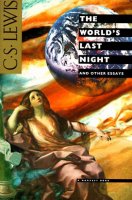 The World's Last Night and Other Essays by C. S. Lewis (Harcourt Brace Jovanovich, 1952)
The World's Last Night and Other Essays by C. S. Lewis (Harcourt Brace Jovanovich, 1952)
This delightful collection contains seven essays, originally published between 1952 and 1959. Lewis's theology and his cultural analysis generally remain accurate and applicable even one-fifth of the way through the 21st century. His specific examples, being tied to his own time and culture, can sometimes be hard to follow, but less so here than in some of his other books.
Two of my favorites remain "Lilies that Fester" and "Screwtape Proposes a Toast," which over the years have become more, not less, accurate in their devastating criticism of our educational system. ("Screwtape Proposes a Toast," though out of courtesy nominally directed at the British system, was largely inspired by American education.)
Here's the table of contents, followed, as usual, by a few quotations.
- The Efficacy of Prayer
- On Obstinacy in Belief
- Lilies that Fester
- Screwtape Proposes a Toast
- Good Work and Good Works
- Religion and Rocketry
- The World's Last Night
From "Lilies that Fester"
To be engaged with the idea of culture, and (above all) of culture as something enviable, or meritorious, or something that confers prestige, seems to me to endanger those very "enjoyments" for whose sake we chiefly value it. If we encourage others, or ourselves, to hear, see, or read great art on the ground that it is a cultured thing to do, we call into play precisely those elements in us which must be in abeyance before we can enjoy art at all. We are calling up the desire for self-improvement, the desire for distinction, the desire to revolt (from one group) and to agree (with another), and a dozen busy passions which, whether good or bad in themselves, are, in relation to the arts, simply a blinding and paralysing distraction. (p. 34)
Those who read poetry to improve their minds will never improve their minds by reading poetry. (p. 35)
The sensitivity that enriches must be of the sort that guards a man from wounding others, not of the sort that makes him ready to feel wounded himself. (pp. 35-36)
Theocracy is the worst of all possible governments. All political power is at best a necessary evil: but it is least evil when its sanctions are most modest and commonplace, when it claims no more than to be useful or convenient and sets itself strictly limited objectives. Anything transcendental or spiritual, or even anything very strongly ethical, in its pretensions is dangerous and encourages it to meddle with our private lives.
I don't think we are in any danger of [Theocracy]. What I think we are really in danger of is something that would be only one degree less intolerable, and intolerable in almost the same way. I would call it Charientocracy. (pp.40-41, emphasis mine)
Charientocracy is a word made up by Lewis, and I will make no attempt to define it. I can't even quote his own definition, because that includes both Greek and Latin, as well as social terms that were meaningful back in Lewis's own time and culture, but not particularly comprehensible now. This article may help, if you are curious. Possibly he would have used the phrase "academic and media elites" today, but that's just a guess. Anyway, it leads into one of my favorite passages, which is so much more true about education today than when he wrote it 65 years ago.
Education is increasingly the means of access to the [Ruling] Class. And of course education, in some sense, is a very proper means of access; we do not want our rulers to be dunces. But education is coming to have a new significance. It aspires to do, and can do, far more to the pupil than education (except, perhaps, that of the Jesuits) has ever done before.
For one thing, the pupil is now far more defenceless in the hands of his teachers. He comes increasingly from [homes] where there are few books or none. He has hardly ever been alone. The educational machine seizes him very early and organizes his whole life, to the exclusion of all unsuperintended solitude or leisure. The hours of unsponsored, uninspected, perhaps even forbidden, reading, the ramblings, and the "long, long thoughts" in which those of luckier generations first discovered literature and nature and themselves are a thing of the past. If a Traherne or a Wordsworth were born today he would be "cured" before he was twelve. In short, the modern pupil is the ideal patient for those masters who, not content with teaching a subject, would create a character.... Or if by chance (for nature will be nature) he should have any powers of resistance, they know how to deal with him. (pp.41-42, emphasis mine)
Modern poets are read almost exclusively by one another. (p. 45)
From "Good Work and Good Works"
Until quite recently ... it was taken for granted that the business of the artist was to delight and instruct his public. There were, of course, different publics; the street-songs and the oratorios were not addressed to the same audience (though I think a good many people liked both). And an artist might lead his public on to appreciate finer things than they had wanted at first; but he could do this only by being, from the first, if not merely entertaining, yet entertaining, and if not completely intelligible, yet very largely intelligible. All this has changed. In the highest aesthetic circles one now hears nothing about the artist's duty to us. It is all about our duty to him. He owes us nothing; we owe him "recognition," even though he has never paid the slightest attention to our tastes, interests, or habits. ... In this shop, the customer is always wrong. ...
As "giving employment" becomes more important than making things men need or like, there is a tendency to regard every trade as something that exists chiefly for the sake of those who practise it. The smith does not work in order that the warriors may fight; the warriors exist and fight in order that the smith may be kept busy. The bard does not exist in order to delight the tribe; the tribe exists in order to appreciate the bard. (pp. 78-79)
"Great works" (of art) and "good works" (of charity) had better also be Good Work. Let choirs sing well or not at all. (p. 80)
From "The World's Last Night"
Jesus professed himself (in some sense) ignorant, and within a moment showed that he really was so. To believe in the Incarnation, to believe that he is God, makes it hard to understand how he could be ignorant; but also makes it certain that, if he said he could be ignorant, then ignorant he could really be. For a God who can be ignorant is less baffling than a God who falsely professes ignorance. The answer of theologians is that the God-Man was omniscient as God, and ignorant as Man. This, no doubt, is true, though it cannot be imagined. Nor indeed can the unconsciousness of Christ in sleep be imagined. (p. 99)
The modern conception of Progress or Evolution (as popularly imagined) is simply a myth, supported by no evidence whatever.
I say "evolution, as popularly imagined." I am not in the least concerned to refute Darwinism as a theorem in biology. There may be flaws in that theorem, but I have here nothing to do with them. … For purposes of this article I am assuming that Darwinian biology is correct. What I want to point out is the illegitimate transition from the Darwinian theorem in biology to the modern myth of evolutionism or developmentalism or progress in general.
The first thing to notice is that the myth arose earlier than the theorem, in advance of all evidence. Two great works of art embody the idea of a universe in which, by some inherent necessity, the "higher" always supersedes the "lower.” One is Keats's Hyperion and the other is Wagner's Nibelung's Ring. And they are both earlier than the Origin of Species. …
The Idea that the myth (so potent in all modem thought) is a result of Darwin's biology would thus seem to be unhistorical. On the contrary, the attraction of Darwinism was that it gave to a pre-existing myth the scientific reassurances it required. If no evidence for evolution had been forthcoming, it would have been necessary to invent it. The real sources of the myth are partly political. It projects onto the cosmic screen feelings engendered by the Revolutionary period.
In the second place, we must notice that Darwinism gives no support to the belief that natural selection, working upon chance variations, has a general tendency to produce improvement. The illusion that it has comes from confining our attention to a few species which have (by some possibly arbitrary standard of our own) changed for the better. Thus the horse has improved in the sense that protohippos would be less useful to us than his modern descendant. The anthropoid has improved in the sense that he now is Ourselves. But a great many of the changes produced by evolution are not improvements. … In the battle for survival, species save themselves sometimes by increasing, sometimes by jettisoning, their powers. There is no general law of progress in biological history.
And, thirdly, even if there were, it would not follow—it is, indeed, manifestly not the case—that there is any law of progress in ethical, cultural, and social history. No one looking at world history without some pre-conception in favor of progress could find in it a steady up gradient. There is often progress within a given field over a limited period. A school of pottery or painting, a moral effort in a particular direction, a practical art like sanitation or shipbuilding, may continuously improve over a number of years. If this process could spread to all departments of life and continue indefinitely, there would be "Progress" of the sort our fathers believed in. But it never seems to do so. Either it is interrupted … or else, more mysteriously, it decays. … The idea of the world slowly ripening to perfection, is a myth, not a generalization from experience. (pp. 102-104, emphasis mine)
Lewis liked the myth a lot; he was especially fond of Wagner's Ring Cycle. But he was under no illusions that it was true.
Perfect love, we know, casteth out fear. But so do several other things—ignorance, alcohol, passion, presumption, and stupidity. (p. 109)
Leaphorn and Chee by Tony Hillerman (HarperCollins, 1992), containing
Skinwalkers (1987)
A Thief of Time (1988)
Talking God (1989)
Having succeeded spectacularly with the Brother Cadfael series, and failed with Ordinary Grace, my son-in-law has hit another home run with Tony Hillerman's Leaphorn and Chee books.
Lieutenant Joe Leaphorn and Officer Jim Chee of the Navajo Tribal Police solve crimes together, though in many of the books I've read so far, they work independently and only come together later in the book. It's an interesting change-up.
I'm making no attempt to read them all in order. I'd rather, but these three are not the initial books anyway, and there are many in the series that our library doesn't have, so I take what I can get. I've read a total of seven so far, and have thoroughly enjoyed every one. This means the events in the lives of the protagonists get rather jumbled, but each mystery is independently understandable and enjoyable.
What I like best: The excellent mysteries, of course, but after that I love learning more about the Southwest—a part of the country I've never even visited except for a brief trip to Arizona—and about Navajo culture.
What I like least: The stories are so wonderfully detailed, and told with what appears to be a high regard for the facts, and with cultural sensitivity, that it actually makes me worry just a little that I might be picking up some wrong ideas—because it sounds so trustworthy!
What surprises me: If you've read my previous reviews, you know I have a very low tolerance for bad language. Yet there is some in these books, and it doesn't bother me one bit. I wonder why, and though I'm only speculating at this point, it's probably a combination of factors:
- The use is very sparse, like the addition of a little spice to a dish rather than a tablespoon of hot sauce.
- It appears appropriate to the characters and the situations.
- It is neither vicious nor puerile.
- The characters manage to use only the words I find least offensive, which when you think about it is quite an accomplishment, considering that I really, really dislike "OMG," which most of America can't seem to get along without.
What puzzles me: Part of the charm of the books is the traditional Navajo culture, and while I find it interesting as history, I can't understand the attitude—which is certainly not limited to these books—that "real" Native American culture is what it was in the distant past. Cultures grow, they evolve, they blend, yet to many people to be "traditional" means one must revert to practices frozen at a particular point in time
A Christian Navajo, for example, seems to be considered an oxymoron, or at best a mongrel who has sold out to the white culture—as if Jesus had been born in England instead of in Israel. Are my Anglican beliefs a denial of my Puritan ancestors? Am I stuck with Calvinism because of the faith of my forebears? The couple of times I attended a real Native American Pow-Wow (albeit Seminole, not Navajo), this joyful celebration of their traditions was also unabashedly Christian. Surely it is possible to enjoy one's ancestral culture and yet differ with them on some points. Truth is independent of both culture and lineage.
Possibly—again, just speculating—when one's culture has been assaulted, and forcibly taken away instead of being allowed to evolve, people may feel the need to reboot, to rewind to the place where their culture was lost, before they can feel comfortable with any change.












